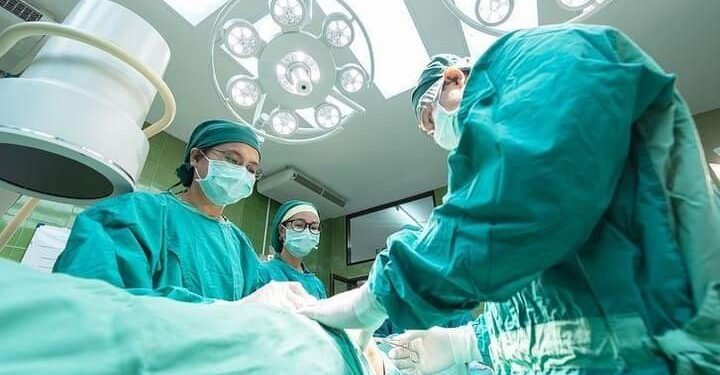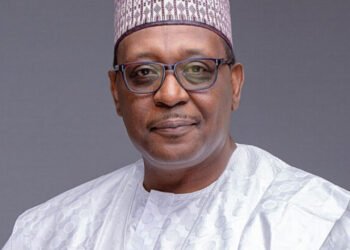The continuous mass exodus of health professionals in the country is causing a strain on the remaining health workers, patients, and the health sector, the Nigerian Medical Association says.
The Federal Capital Territory Chairman of the Nigerian Medical Association, Dr Charles Ugwuanyi, while speaking with PUNCH Healthwise noted that the mass exodus, popularly known as japa, has further led to a shortage of doctors and nurses, and caused the closure of some health facilities.
According to him, the current ratio of doctors to patients is now one doctor to 7,100 patients.
Recently, the Chairman of the House of Representatives Committee on Health Dr Amos Mogaji, stated that five wards with about 150 beds had been closed in the Lagos University Teaching Hospital due to a shortage of health workers.
Findings showed that the United Kingdom was the choice destination for Nigerian-trained health workers.
According to the register of the General Medical Council of the UK, about 1,197 Nigerian-trained doctors immigrated to the UK from May 29 to December 1.
Noting that this brings the total number of licensed Nigerian-trained doctors working in the UK to 12,198.
He explained that the Nigerian Medical and Dental Council’s registry which contained the details of all registered doctors in the country contained above 110,000 but “as at the last count which is just a few months back, the people who have paid for their annual practising license, which by implication are the numbers of doctors working here or supposed to be working are less than 30,000.”
This implies that about 30,000 doctors were left in the country to serve over 213 million Nigerians.
Speaking against this backdrop, the FCT NMA explained that the emigration of health workers had been happening gradually but increased in the past two to three years.
As a result, he continued, four doctors were expected to do the work of 20 doctors and one doctor, the work of five.
Ugwuanyinoted that the only option left for the medical healthcare workers was to scale down their operations, as a result, in sectors where there are not enough nurses or doctors, the facilities are closed.
Speaking on the doctor-to-patient ratio, Ugwuanyi said that it is now one doctor to nearly 5,000 to 7,000 patients.
“The ratio of the doctor per patient, you are talking of one doctor attending to nearly 5,000 to 7,000 patients. This is impossible and the funny thing is that when things go wrong, the doctors would be criticised,” he added.
Ugwuanyi decried the lack of planning, human resources and capital developments in the health sector by the government.
He further noted that newly registered and licensed doctors were leaving every day, stating that doctors are “leaving the country per second.”
The NMA FCT Chairman stated that many doctors working with the government have not had salary increase since 2010, adding that this condition, when compared to the opportunities abroad, prevented young doctors from remaining in the country.
He also said that the specialist doctors were leaving in droves due to the low remuneration and heavy workload.
Ugwuanyi also noted that insecurity in the country also fueled the mass exodus and condemned the constant kidnap and killings of doctors.
He said about four doctors died in the FCT in November, attributing the cause of death to stress.
“My members are overworked. Last week, I lost three of my members here in FCT. They slept and did not wake up. What is the cause of death? Stress. The doctor goes to bed at night and in the morning, the door has to be broken down. This is the situation every month. Hardly a month passes by without me losing a doctor in the FCT, yet someone is looking for our downfall.
“A doctor was murdered in cold blood in his consulting room and the perpetrator is yet to be arrested.
“At NMA, we are helpless because we don’t have any executive powers. We have ideas on how to make the system work but the people who have the power to sign the document don’t listen or look for reasons not to listen.
“What is happening now is a child’s play of what awaits us because there is just so much a man can take before he breaks. There has to be a system that works for everybody. What is going on in the country is not sustainable,” he noted.
He also decried the lack of implementation of the 25 per cent salary increase.
In the FCT, Ugwuanyi noted that many private hospitals had closed down while the surviving public hospitals are “squeezing the resources they have to do more work but that has an expiry date because when you work people to a certain level, there is going to be the law of diminishing return.”
The Neurosurgeon and Neurocritical Care specialist stated that stroke is a common health condition in the FCT but there are only a few specialist doctors left to handle the cases.
He stated that the National Hospital saw not less than three to four stroke cases every day, noting that 80 per cent of the patients died from the condition.
He noted that there are not enough specialists to attend to the patients, adding, “If there were 15 neurosurgeons in Abuja last year, currently, I’m not sure that they are up to five. We don’t have dermatologists and rheumatologists. The few rheumatologists we had all left. What is sustaining the orthopaedic services in Abuja are the private practices. A lot needs to be done.”
Speaking on the increased incidence of stroke, the doctor said, “Why is stroke happening so much now? It is a reflection of the harsh socioeconomic status that we all find ourselves in. The government is trying with palliatives but that is like a drop in the Ocean, the only palliative that works is to improve the quality of life and conditions of living by getting a system that works for everybody,” the doctor noted.
He appealed to the government to create a suitable environment that would make doctors stay, improve the socioeconomic indices, and provide adequate security and a system that worked for everyone.
Text except headline courtesy of Punch











